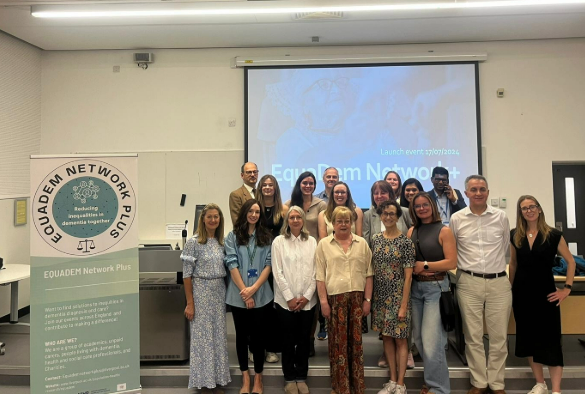Colleagues gather for the ESRC Equalities in Dementia Network Plus launch
University alumna and former public health researcher, Debbie Abrahams MP joined delegates at the inaugural ESRC Equalities in Dementia Network Plus event this week.
The Labour MP and Co-Chair of the All-Party Parliamentary Group (APPG) on Dementia joined remotely from Westminster to welcome the 130 delegates. People with dementia, unpaid carers, health and social care professionals joined for the launch of the first national network dedicated to finding solutions to inequalities in dementia diagnosis and care.
It was announced recently that the Alzheimer’s Society, Economic and Social Research Council (ESRC) and National Institute for Health and Care Research (NIHR) have awarded £5.5 to four dementia networks – of which the ESRC Equalities in Dementia (EquaDem) Network Plus, received £1.5m.
Spearheading the new network is Dr Clarissa Giebel, Senior Research Fellow in the Institute of Population Health at the University of Liverpool and Dame Louise Robinson, Regius Professor of Ageing at Newcastle University. Together they will bring together a network of people with academic, professional, and lived experience and expertise of dementia.
Dr Giebel said: “Sadly, our ongoing research illustrates the significant disparities in diagnoses and care with ‘postcode lotteries’ of access to help. This event was a huge success with lively discussion and clear will from all attendees to work together to address this urgent issue. Louise and I were particularly pleased to welcome Debbie Abrahams, who we will be working closely with in her role as Co-Chair of the AGPPG on Dementia. Today marks the start of our important journey where we will bring together opinions, knowledge and voices from across the UK to address these inequalities.”
Debbie Abrahams MP said: “I am proud to play a role in the launch of the first national network dedicated to finding solutions to inequalities in dementia diagnosis and care and I’m thrilled to see this level of recognition and investment into Dementia research.
“Dementia currently affects nearly a million people in the UK, and this number is expected to rise. To ensure that those affected receive the necessary support and understanding, we must fund research and raise awareness about the brain diseases that cause dementia.
“The £1.5 million grant to the EquaDem Network has come at a vital time. Inequalities in dementia care are widening, this network provides a unique opportunity to focus on both solutions and support.
“Congratulations to all those involved in this crucial project, I look forward to seeing further research and investment into Britain’s leading cause of death, dementia.”
Debbie Abrahams MP joined remotely from Westminster to welcome delegates
More about dementia and EquaDem Network Plus
One million people are living with dementia in the UK and it is now the leading cause of death ahead of cancer, cardiovascular disease and stroke, and is also a major cause of disability later in life. It’s a global public health concern, which not only affects the person living with the condition, but their family members and friends. People living with dementia and their unpaid carers often face many inequalities in accessing care and obtaining an assessment and diagnosis.
The EquaDem Network Plus aims to develop solutions to barriers in dementia diagnosis and care and impact clinical and social care practice. By closely working together with people living with dementia and unpaid carers, as well as care professionals and Third Sector organisations, the Network will create a Community of Research and Practice to find solutions to inequalities, linked to knowledge mobilisation internships and pilot projects. Their solutions include delivering key policy and practice guidance, alongside submitting evidence to the All-Party Parliamentary Group on Dementia. This will be part of a wider strategy to communicate research findings to a range of audiences and policy makers who will focus on implementing their recommendations.
